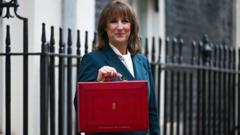Properties worth more than £2m in England face new tax
NegativeFinancial Markets

- Properties valued over £2 million in England will be subject to a new tax surcharge, starting at £2,500 and increasing to £7,500 for properties exceeding £5 million. This measure is part of the government's strategy to enhance revenue from high-value real estate amidst ongoing economic challenges.
- The introduction of this tax is significant as it targets affluent property owners, potentially impacting the housing market and local economies. It reflects a broader trend of increasing taxation on high-value assets to address public funding needs.
- This development aligns with recent initiatives allowing local mayors to impose tourist taxes, indicating a shift towards diversifying revenue sources for local councils. As tourism continues to rise, these financial strategies may become essential for maintaining public services and infrastructure.
— via World Pulse Now AI Editorial System







